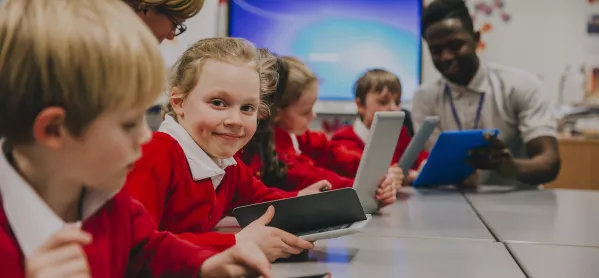More than 250,000 children started school in September without the necessary basic skills, according to a new report.
It suggests a lack of school readiness has been exacerbated by the coronavirus pandemic.
It cites findings from a YouGov poll of teachers, saying that nearly half - 46 per cent - of four- to five-year-olds starting key stage 1 in 2020 were not school ready.
They were unable to achieve basic skills like using the toilet, listening, sharing and responding to questions - all considered milestones children should have reached by their first day of school.
Part of the job?: Should teachers be expected to toilet-train pupils?
News: Schools faced with pupils in nappies or sucking dummies
Ofsted: Most pupils have ‘slipped back’ during pandemic
Lockdown: Pupils are bringing online squabbles into school, Ofsted finds
In the YouGov survey for the charity Kindred, a few teachers in the North East and parts of the South West reported an increase of 70 per cent in the proportion of pupils who were not ready to start school.
Kindred said the record numbers of pupils who were not ready for school had been “exacerbated” by the pandemic.
“Lack of school readiness [is] up by 10 per cent, resulting in a stressful, demoralising learning environment for teachers and pupils,” the charity said.
The inability to hold transition days, “stay and play” sessions, nursery and home visits during the lockdown had meant teachers’ had noticed increased levels of separation anxiety for pupils.
One teacher said: “They have poor speech and language skills - this year there is a jarring difference as they have missed four months in nursery.
“A backslide in speech has a negative impact on how we get through our phonics program. Some kids can’t pronounce their own names.”
Teachers say they have seen a loss of inquisitiveness in pupils, as well as poor attention and language skills, which they attribute to overuse of technology by children and parents.
Lack of communication skills can result in poor behaviour from frustration, as well as lower confidence for pupils, leaving them feeling isolated and embarrassed among their peers.
“Some children who aren’t fully toilet trained are having to change their clothes two or three times a day - that’s a lot of time out of class, and other children start to notice as well,” one staff member reported.
Earlier today, headteachers reported that the youngest pupils are playing on their own in silence rather than with other children, as well as an increase in the number of pupils coming into school in nappies or sucking a dummy.
The news follows a report from Ofsted that has found most pupils have regressed in their learning because of the pandemic.
The YouGov research found that “on an average day, it is estimated that six hours of staff time across teachers, teaching assistants, support staff and the leadership team is lost from their priorities” in helping pupils who are not school-ready.
Teachers report they could be losing around 195 hours of teaching time per class and 390 hours of teaching assistants’ time.
“This comes at a cost not just for children missing out on teaching but a financial cost on already stretched school budgets,” Kindred said.
“Our research also reveals a clear discrepancy between parent and teacher expectations of ‘school readiness’. In discussions with teachers they called for improved support and information for parents, the joining up of early years services and better targeting of these services to the families facing the greatest challenges,” the charity added
“Strong evidence shows higher early years development spending leads to improved later life earnings, particularly for pupils from poorer backgrounds. The same impact delivered by £1 in early years costs £7 if you wait to intervene in adolescence.”
The charity says that teachers are calling for a streamlining of government early years services, as well as improved guidance to parents about what it means to be ‘school-ready’.




